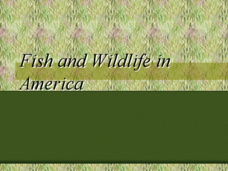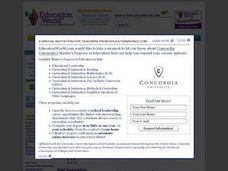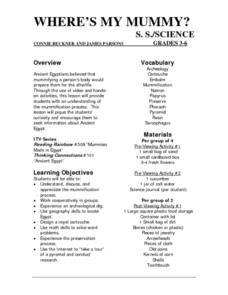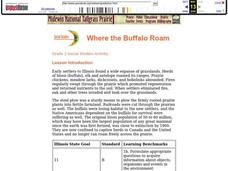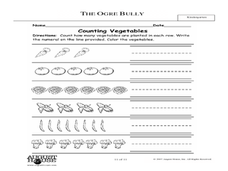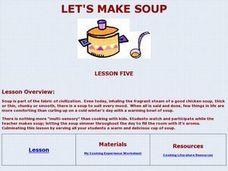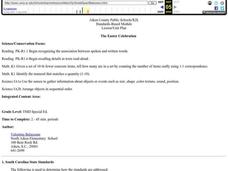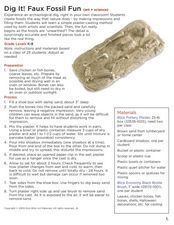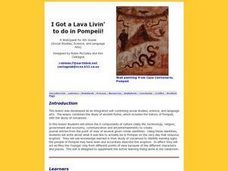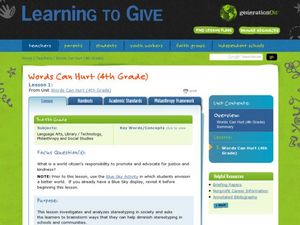Curated OER
The Five Senses of Thanksgiving
For this Thanksgiving worksheet, students write about what they see, hear, smell, taste, and touch on Thanksgiving in different chickens. Students complete 5 chickens about their senses.
Curated OER
Prehistoric Discoveries
Students agree or disagree with several statements about ancient animals, then read a news article about recent prehistoric discoveries. For this earth science and current events lesson, the teacher introduces the article with a...
Curated OER
What is the Evidence for Evolution?
Middle schoolers identify one object that would tell the story of their lives. In groups, they determine what can and cannot be told from objects left behind. After watching a video, they compare and contrast chicken bones to human...
Curated OER
Agriculture: Oklahoma's Legacy
Sixth graders explore agriculture as it relates to crops over the course of a series of historical events. They read and create a timeline of the 50-year increments that depict important cause and effect events. Students then use...
Curated OER
A Lucky Break
Students complete activities where they identify and decipher common phrases that are related to poultry and then cook drumsticks as a class. In this poultry lesson plan, students also read the history of the chicken and create idioms.
Curated OER
Forest Habitat Fragmentation
Seventh graders discuss the loss of animal habitats and the importance of refuge areas for them. They collect small pictures of animals found in their state and glue them to an outline of their state according to their range. Finally,...
Curated OER
Fish and Wildlife in America
Some of the details of the use of wildlife as food and crop resources are given at the beginning of this slideshow. Next, the historical problems with wildlife are explained, as are some mistakes that have been made leading to extinction...
Curated OER
Make A Mummy: The Science of Mummification
Students research the history of mummification. They work together to create an apple mummy. They write a paragraph about what they gathered while doing the experiment.
Curated OER
Where's My Mummy: Preservation Techniques
To observe preservation techniques firsthand, learners dry a flower in sand and compare cucumber slices soaked in salt water for a week with slices left out to dry in the open air. Video resources (not attached) include one about mummies...
Curated OER
Where the Buffalo Roam
Second graders explore what life in the Chicago area was like hundreds of years ago. They discuss how settlers impacted the environment, and why there are no longer herds of buffalo in the Chicago area today. They read an article and...
Curated OER
Spread of Disease
Seventh graders discover facts about the human body. In this diseases lesson, 7th graders understand different kinds of diseases, how disease spreads, how diseases have changed and preventative medicines. Students debate different...
Curated OER
Human Embryology
Ninth graders are introduced to the concept of human embryology. Individually, they complete an exercise in which they determine which trait they got from which family member. In groups, they identify and label the reproductive organs...
Curated OER
Agriculture- It's More Than You Think
Students research careers in agriculture. In this agricultural lesson, students discover the various careers related to agriculture. Students construct resumes and "apply" for agricultural jobs.
Curated OER
Real People, Real Farms: Case Studies of Animal Agriculture
Students explore sustainable animal production. In this agriculture lesson, students examine how animal production is managed in the US and world. They apply this knowledge to real life situations by evaluating the sustainability of a...
Curated OER
The Ogre Bully Lesson
Students investigate bullies, agriculture and cooking by completing worksheets about a book they read. In this story analysis lesson, students read the story The Ogre Bully, and discuss bullying as well as farming with their...
Curated OER
Let's Make Soup
Students investigate the fresh produce native to specific parts of the world. In this culinary lesson, students complete a cooking worksheet based on the ingredients used in cultural dishes. Students help create a bowl of...
Curated OER
The Easter Celebration
Students read a short story about Easter. They recognize and point to pictures of the key words (egg, chicken, rabbit, basket, flower). They make an Easter basket and count how many chickens can fit inside. They also practice identifying...
Curated OER
Faux Fossil Fun
Elementary schoolers investigate how fossils are created by reproducing the process of creating an impression and filling it with a hardening material. The art lessons from this source are just fantastic! The lesson plan is well-written...
Curated OER
A Recipe for Reading: Asian Style Rice and Eggs
Learners read, write about, and cook with rice in this home economics lesson. They reflect on the experience eating rice at home or in other ethnic foods.
Curated OER
I Got a Lava Livin' to Do in Pompeii
Scholars imagine themselves as citizens of Pompeii in 79 AD. First they are assigned a job (or place in society like a child or slave). Then they record their daily activities for the weeks leading up to the eruption of Mt. Vesuvius in...
Curated OER
History in the Making: The Tortilla
Fourth graders examine the history of the tortilla and extend the study across the curriculum. In this history of the tortilla lesson, 4th graders research the background of the tortilla, determine the ingredients, and work with the...
Curated OER
YOUR OWN CAMPAIGN
Twelfth graders, in groups propose a new law and design a campaign to get people to vote for their law. They have a voter's forum and hold a mock election.
Curated OER
Words Can Hurt: King Day
Students explore stereotyping. In this moral and character development lesson, students share reactions to a T-chart displaying what boys can do and girls can not do. Martin Luther King's accomplishments are discussed, and students...
Curated OER
Policies of Containment
Pupils examine SARS outbreak in Toronto and its impact on the economy, government and society. They, in groups, research policies and programs designed to curb the spread of diseases, and create presentations assessing their effectiveness.






